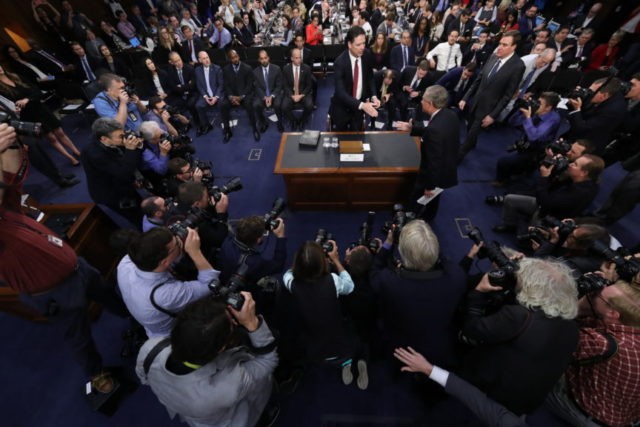James Comey asserted in his extraordinary testimony before the Senate Intelligence Committee that the director of the Federal Bureau of Investigation is authorized to override Justice Department oversight procedures, a questionable claim which if true would raise serious questions about long-standing rules aimed at preventing abuses by federal law enforcement officials.
The former head of the FBI told the Senate panel that he believed he had received a direction from the president in February that the FBI end its investigation of Michael Flynn’s alleged involvement with Russia–a direction with which he and his kitchen-cabinet of “FBI senior leadership” unilaterally decided not to comply. The Comey cabinet then decided that it would not report the receipt of this direction to Attorney General Jeff Sessions or any other Justice Department superior.
The group decided that it could override standard FBI protocol and possibly legal obligations to report the incident because of its expectations that Sessions would recuse himself from the Russia matter, although that recusal would not come until weeks later. The Comey cabinet also decided that it wasn’t obligated to approach the acting Deputy Attorney General because he would likely be replaced soon.
“We concluded it made little sense to report it to Attorney General Sessions, who we expected would likely recuse himself from involvement in Russia-related investigations. (He did so two weeks later.) The Deputy Attorney General’s role was then filled in an acting capacity by a United States Attorney, who would also not be long in the role,” Comey said. “After discussing the matter, we decided to keep it very closely held, resolving to figure out what to do with it down the road as our investigation progressed.”
According to three different former federal law enforcement officials, who spoke on the condition of anonymity, there is no precedent for the director of the FBI to refuse to inform a Deputy Attorney General of a matter because of his or her “acting” status nor to use the expectation of a recusal as a basis for withholding information.
“This is an extraordinary usurpation of power. Not something you’d expect from the supposedly by-the-books guys at the top of the FBI,” one of those officials told Breitbart News.
The closest precedent to the Comey cabinet’s decision to conceal information from Justice Department superiors is likely Comey’s widely criticized earlier decision to go public about the investigation of Hillary Clinton’s emails. That decision received a sharp rebuke in the May 9 memo by Deputy Attorney General Rod Rosenstein that formed the basis for Comey’s firing by Trump.
Rosenstein criticized Comey’s decision to act without consultation from the Department of Justice as usurping the Attorney General’s authority and an attempt to “supplant federal prosecutors and assume command of the Justice Department. Comey had violated a “well-established process” for how to deal with situations where to Attorney General faces a conflict of interest, according to Rosenstein.
“The Director was wrong to usurp the Attorney General’s authority on July 5, 2016,” Rosenstein wrote. “The Director now defends his decision by asserting that he believed attorney General Loretta Lynch had a conflict. But the FBI Director is never empowered to supplant federal prosecutors and assume command of the Justice Department. There is a well-established process for other officials to step in when a conflict requires the recusal of the Attorney General. On July 5, however, the Director announced his own conclusions about the nation’s most sensitive criminal investigation, without the authorization of duly appointed Justice Department leaders.”
Comey’s testimony on Thursday seemed to double-down on this defense, which amounts to a claim that the FBI’s top agents can act outside of the ordinary processes intended to establish oversight and accountability at the nation’s top law enforcement agency.
The FBI’s adherence to Department of Justice guidelines and instructions from Attorneys General has been a centerpiece of its ongoing independence, often cited by officials as a reason why the FBI does not need a general legislative charter that would restrict or control by statute its authority. Comey’s assertion that the FBI can override standard protocols could endanger that independence, according to a former high-ranking federal law enforcement official.
“He’s not only put the credibility of the bureau in doubt, he’s now putting the entire basis for our independence in jeopardy,” the official said.
The official pointed to an editorial in the Wall Street Journal as explaining the dangers of an FBI that decides not to inform the Department of Justice of its activities.
“Mr. Comey is describing an FBI director who essentially answers to no one. But the police powers of the government are awesome and often abused, and the only way to prevent or correct abuses is to report to elected officials who are accountable to voters. A director must resist intervention to obstruct an investigation, but he and the agency must be politically accountable or risk becoming the FBI of J. Edgar Hoover,” the Wall Street Journal wrote.
A 2005 report from the FBI’s Office of Inspector General on the Department of Justice’s guidelines for FBI investigations stated, “Attorneys General and FBI leadership have uniformly agreed that the Attorney General Guidelines are necessary and desirable, and they have referred to the FBI’s adherence to the Attorney General Guidelines as the reason why the FBI should not be subjected to a general legislative charter or to statutory control over the exercise of some of its most intrusive authorities. ”

COMMENTS
Please let us know if you're having issues with commenting.